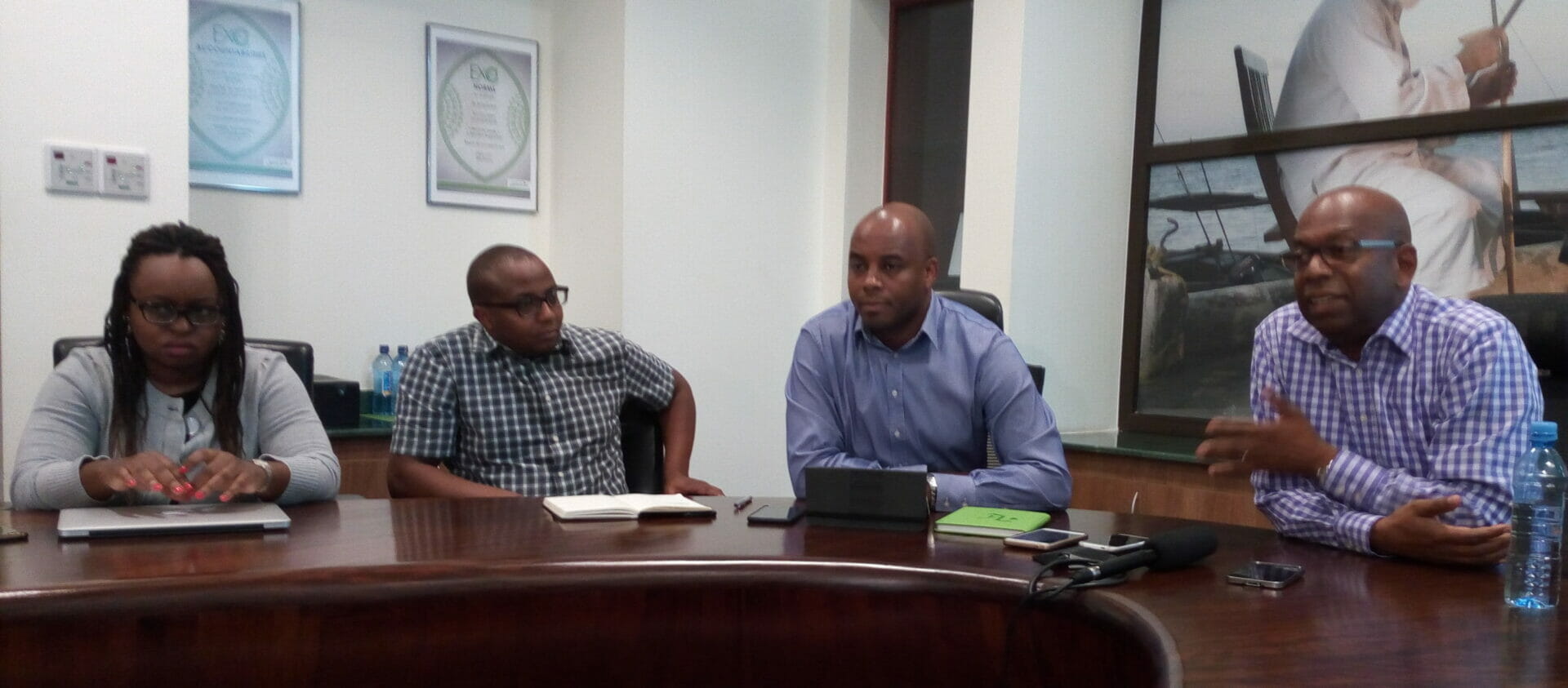Caption: Bob Collymore and senior managers addressing the press today, over serious allegations touching on financial impropriety that were raised on this website.
Faced with uncertainty over his job, fraud allegations against top managers and general fatigue by Kenyans over unfair domination and anti-competitive practices, Bob Collymore finally responded directly to Cyprian Nyakundi.
Even though he didn’t dispute the facts raised in the article, the Safaricom CEO only raised issue against the manner with which confidential documents were leaked to this blog.
It’s called credibility Mr. Collymore. Something you should consider employing more often. We have been consistent in pointing out the contradictions between your loud talk and the reality on the ground. We are also perhaps the only outlet that isn’t impressed by your money. Because Mr. Collymore, what you eat don’t make me shit!
If you want to be a crook, by all means be a thief like Jimnah Mbaru who steals and lays low like an envelope. But don’t be a thief, and then come to lecture Kenyans from a moral high-ground. That we shall not take lying down.
Your silly cartels involving advertising agencies, contractors, vendors and service providers which lock out meritorious Kenyans from getting involved in the publicly-listed firm, should be warned Mr. Collymore.
According to Dhahabu, Safaricom has raised concerns over leaking of confidential documents of private organization and presenting them to Parliament stating that it impedes integrity practices in organizations.
In a media briefing, Safaricom CEO Bob Collymore took issue with a draft confidential report that was first presented in Parliament as a petition and later published by www.cnyakundi.com.
The report shared is a draft confidential document which I commissioned to establish good governance and integrity practices in the organization, he said
The draft document was presented in the National Assembly on Thursday and the Speaker asked that the Finance Committee looks into it. The document was a draft report by audit company KPMG who had been contracted to undertake the forensic analysis of various practices and decisions relating to contracts to companies between September 2013 and August 2015.
The petitioner in the document is Michael Ngugi. Safaricom said that they have not interacted with him, neither have they done business with him or his company to their knowledge.
Collymore explained that he personally commissioned the report and sought KPMG assistance because they had done a previous audit of the company and recommended certain measures. He brought them back to check whether they had complied with the processes and structures KPMG had recommended and any further recommendations they should work on.
As a draft document, its contents had not been discussed with the management and key personnel at the telco before sending them back to the auditors to author their final report. It was equally a privileged document that only a few people had access to it.
Safaricom’s Corporate Affairs Director Steve Chege took issue with the leaking of confidential documents stating that it will make private companies shy away from conducting forensic audits because those audits will be made public.
The document was presented to Parliament in record speed. It is critical that this practice of sharing confidential documents, which are privileged in private companies seizes because it threatens to root out corruption, he said.
The company read malice in the presentation of the report to the National Assembly questioning the speed with which it was presented and tabled on the floor of the House. Mr. Collymore was however quick to distance their competitors stating that it could be businesses who have unsuccessfully sought to transact with them and are seeking vendetta.
While declining to comment on the contents of the report, Collymore stated that he intends to take stern action against those found culpable in corrupt practices at Safaricom.
You can be sure that I did not commission this report to just sit on my desk. I am very clear and committed on instilling integrity practices and processes in Safaricom. My stand against corruption is also clear. I also promise that we will investigate and bring to book the person who leaked the draft confidential document.
KPMG has already presented their final report to him but he said he is still reading it. Collymore added that the access to the report has been very limited and investigations would easily find the individual who leaked it.
I do not shy away from consequence management. As a company we have always made public the number of people who leave the company every year by being fired, albeit we do not disclose their identities because it is a legal issue.
The company is a signatory of the Kenya Business Code of Ethics, a corporate sustainability initiative enforced through the Kenya Private Sector Alliance (KEPSA) and the Kenya Association of Manufacturers (KAM).
The final report will not be made public because it touches on individuals and companies who could find it libelous. But Mr. Collymore was quick to add that its recommendations will be implemented to the latter. But don’t worry Mr. Collymore. We probably have the document already.
